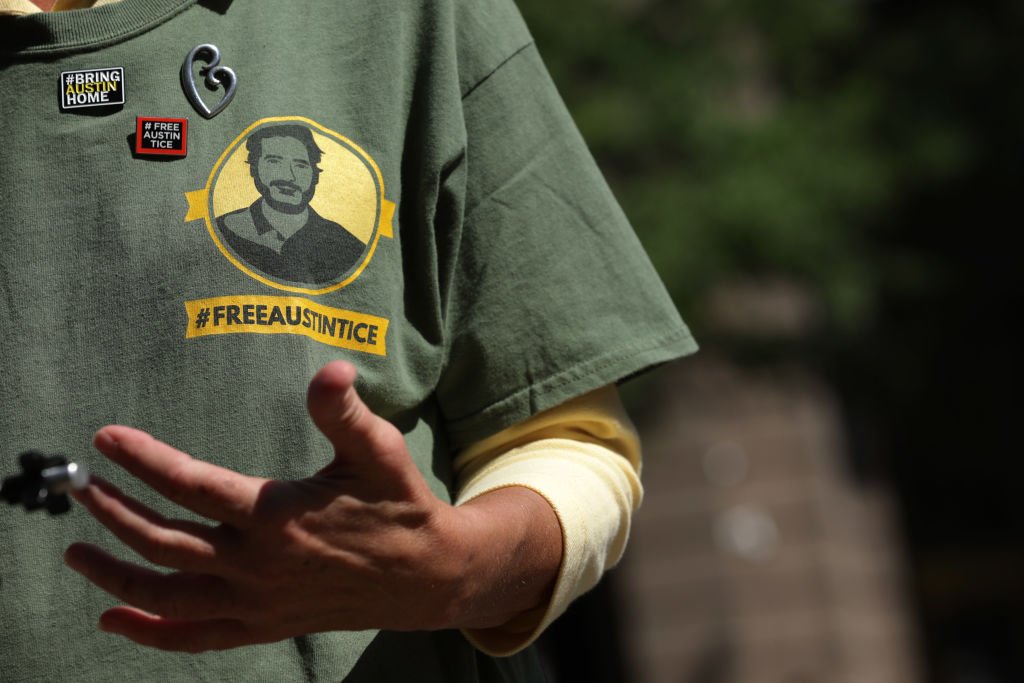Listen to article
Ten years have passed since journalist Austin Tice was taken by gunmen in Daraya, a suburb of Damascus. During that decade, his parents, Debra and Marc Tice, have waged a persistent, insistent, and dignified campaign on behalf of their son, one centering on their demand that the U.S. government engage Syria’s Assad regime to secure Austin’s release.
To date, however, the regime acknowledges neither culpability in the taking of Austin Tice nor responsibility for his well-being and ultimate release. As recently as Aug. 17, the regime denied kidnapping or holding Tice. Other than demanding that it be engaged by U.S. officials of appropriately high rank – words it first used years ago in rejecting a meeting with Debra Tice – and telling visiting U.S. officials in 2020 that, among other things, U.S. forces should depart Syria before American interests are addressed, the regime has been silent on this issue.
Despite regime denials and defiance, however, it is the Biden administration that is being pressured over Austin Tice’s ongoing captivity. The 10th anniversary of Tice’s capture was marked by widespread criticism of the administration being insufficiently energetic in securing his release.
Demands that the U.S. government do more to secure Tice’s release, particularly when they come from his parents, are understandable and justifiable. And no, it is not up to Debra and Marc Tice to define the content or parameters of “do more.” They are fully entitled as parents to demand that their government do whatever it takes to bring their son home.
No doubt Austin’s parents realize that a “whatever it takes” approach would place enormous leverage in the hands of the Syrian regime. Their sole priority is, as it should be, the return of their son. It would be improper to try to draw them out on what precisely should be done. More, however, should be expected from critical media commentators who, quite rightly, want a courageous American reporter released from the grip of a murderous regime but who suggest that American governmental indifference plays a significant role in Tice’s ongoing captivity.
For example: what is one to make of a recent statement by the publisher of The Washington Post? “The United States should not stand by when Americans are held hostage. We cannot continue to let Austin languish in Syria. The Biden administration must increase the efforts to secure Austin’s release.” Meaning what? That U.S. government officials are indifferent to the status of Austin Tice? That Washington is somehow complicit in his languishing?
A subsequent Post editorial suggested that Biden should contact Syrian President Bashar al-Assad directly and demand proof that Austin Tice is alive. Would that gesture check the Post’s increased effort box? Would Assad comply? Would he even take a call? With over 11 years of experience with abysmal American policy performance in Syria, what would incline Assad to take such an inquiry seriously? And the Post is far from alone in implying that the effort to secure Tice’s freedom is half-hearted and incompetent. Surely the newspaper and its media colleagues know that it is the Assad regime that has the decisive vote on this matter.
Biden stated recently that the U.S. “knows with certainty” that Tice “has been held by the Government of Syria.” This formulation was similar to words employed twice by a State Department spokesperson during an Aug. 11 telephonic press conference: “The U.S. government knows with certainty that Austin was held by the Syrian government and that they have the power to release him.”
The Biden formulation implies certainty that the Assad regime has, at least in the past, exercised custody over Austin Tice. It does not rule out ongoing custody. The words of the State Department spokesperson seem to imply past custody but not present. Both formulations, however, would be consistent with a scenario in which the Syrian government, at some point, transferred Austin Tice from detention by officials to an unofficial entity – perhaps a criminal gang/militia – not employed by the government, but one fully responsive to the family and entourage of Bashar al-Assad.
Deniability would be the goal of such an arrangement, an objective obviously not achieved. Under this transfer scenario, one might have envisioned Assad’s security forces staging an ersatz “rescue mission” once the Austin Tice controversy had been milked to the maximum in terms of political concessions. Surely such fakery would not matter to parents seeking the freedom of their son. But what might the Assad regime want in return for “rescuing” Austin Tice?
One can imagine words like the following flowing from the lips of a Syrian official to the ears of an American counterpart: “We believe Austin Tice is alive. We think he is being held by an armed group we do not control in a place unknown to us. Securing his release would entail great effort and risk. We are, however, prepared to undertake that effort and assume that risk provided we see Washington demonstrating good will toward Syria. We want to see substantial progress in three areas before we place Syrian lives at risk for the sake of freeing an American citizen we do not hold: the withdrawal of all U.S. military forces from Syria; the lifting of U.S. objections to Syria’s reconstruction under the auspices and direction of the Syrian Arab Republic Government; and the termination of U.N. and other humanitarian assistance initiatives bypassing said government.”
Debra and Marc Tice have been understandably critical of U.S. officials – particularly those in the Trump administration – who resisted the prospect of being blackmailed by a terrorist entity posing as a state. Former National Security Adviser John Bolton has recently been outspoken on this issue. Surely the current administration is similarly concerned by the prospect of blackmail and has sought alternatives.
Perhaps it has (for example) reached out to the United Arab Emirates for help in securing Austin Tice’s freedom. The UAE seems, after all, thus far to have gotten nothing in return for diplomatic normalization with Syria or for having hosted Assad in a state visit. What is Abu Dhabi getting for the tens of thousands of Syrians languishing in Assad’s dungeons and for Austin Tice? Efforts by the administration to seek Tice-related information through an official Lebanese intermediary have been well-publicized. Presidential Special Envoy for Hostage Affairs Roger Carstens has visited Damascus to try to engage with the Syrian government.
President Biden noted in his Aug. 10 statement on Austin Tice’s captivity, “There is no higher priority in my administration than the recovery and return of Americans held hostage or wrongfully detained abroad.” Indeed, the first duty of American foreign policy is to protect U.S. citizens abroad. Still, what would be the consequences of yielding to blackmail for the sake of favorably terminating a hostage situation? Everyone would celebrate the safe return of Austin Tice under any circumstances. But would the safety of Americans abroad be enhanced if Washington were to succumb to blackmail to free Austin Tice?
Then there is the matter of U.S. policy toward Syria and the role the Tice matter might play in steering it. The U.S. executive branch is composed, as one might expect, of officials with differing views about what U.S. policy toward Syria should be. Those views would certainly consider the Tice situation as a factor in moving forward.
For example: Biden administration figures who support normalization with the Assad regime – if such figures exist – might make the case now for moving voluntarily in that direction, presumably to avoid blackmail and to do what they would argue would be in American interests anyway. Their Tice-related hope would be that the Assad regime, seeing U.S. opposition to it being liquidated voluntarily, would reward the trend by being forthcoming on Austin Tice. Such an approach would seem to require at least three things in advance: a careful review of the global policy implications of accepting total defeat at the hands of the regime, Russia, and Iran in Syria; certainty that Tice is alive; and a sober assessment of the willingness of Assad to act with reciprocity on Tice instead of simply pocketing gains offered gratuitously.
An opposite approach from officials favoring a firmer American hand in Syria might be for the administration to study carefully and draw lessons from the 1904 Perdicaris Affair, involving the taking of an American hostage by a Moroccan brigand named Ahmad al-Raisuni. The State Department, at the direction of President Theodore Roosevelt, issued an official statement which history has boiled down to the following: “Perdicaris alive or Raisuni dead.” The American was freed not long after the statement was issued. Such an approach would be no less risky than one of preemptive capitulation or outright submission to blackmail. Although contingency planning would certainly be justified, the “or else” aspect of this approach would require a degree of presidential commitment not seen in Washington’s Syria policy over the past decade-plus.
A third approach would be to continue to press publicly and through intermediaries for the release of Austin Tice without considering coercive measures while trying to avoid the appearance or reality of submitting to blackmail. Administration officials keen on playing for time in Syria – neither capitulating to the regime and its supporters nor increasing the U.S. profile in Syria beyond anti-Islamic State operations and providing humanitarian assistance – might favor such an approach. The Tice family and its media supporters would see it as more of the same and continue to voice objections.
Debra and Marc Tice want their son back at any price. Any parent similarly tormented would want the same. No doubt media opinion writers demanding that Biden do more and even implying lazy indifference on the part of U.S. officials think they are doing a service by keeping Austin Tice front and center. Yet unlike parents living in the purgatory of day-to-day desperation, they should try harder to explain to their readers what exactly they think the president should do and the potential consequences – intended or not – of what they recommend. That they avoid doing so reflects the enormous difficulty this or any administration faces in trying to free Austin Tice from the clutches of people unencumbered by ethics, morality, or decency. As we encourage our government to act diligently to secure the freedom of Austin Tice, let us at least remember the name of the person responsible for his captivity: Bashar al-Assad.
Frederic C. Hof is the author of “Reaching for the Heights: The Inside Story of a Secret Attempt to Reach a Syrian-Israeli Peace.” He teaches at Bard College.
The views expressed in this article are those of the author and not an official policy or position of the New Lines Institute.






